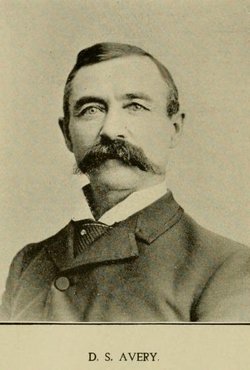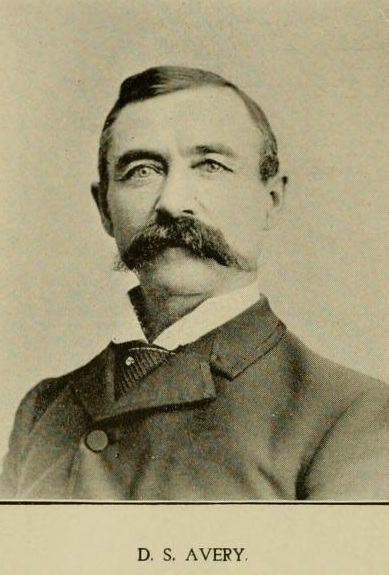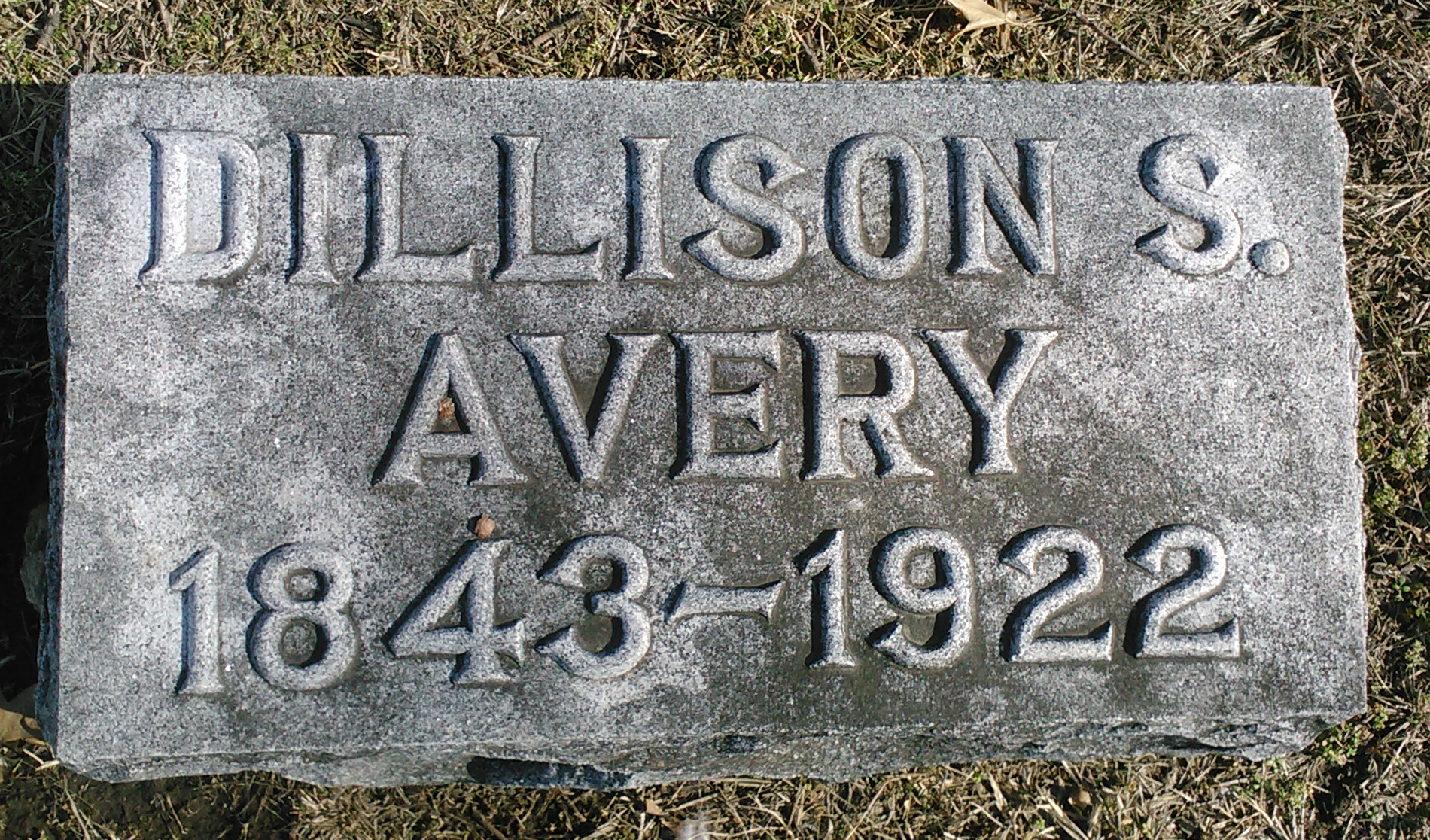*****************************
The Emporia Gazette, 15 Dec 1922, Friday
D. S. AVERY DEAD
D. S. Avery, for many years a retail meat dealer in Emporia and a veteran of the Civil War, died this morning at 5 o'clock this morning at his home in Overland Park. He had been sick a week.
The body will be brought to Emporia Sunday on Santa Fe train No. 5 and funeral services will be held at 2 o'clock Sunday afternoon in the Dumm Chapel.
Mr. and Mrs. Avery moved to Overland Park from Emporia in the spring of 1920, after a residence of many years here. They lived at 710 Mechanic Street. Mr. Avery was an early settler in Lyon county. He came to the county fresh from the campaigns after the Civil War, after he was mustered out of Company B, Eleventh Michigan Volunteer Infantry. He settled on a farm near Allen, and in 1882, came to Emporia. Mrs. Avery is a daughter of the late Rev. Solomon Brown, pioneer Christian minister in Emporia. Mr. and Mrs. Avery were married November 11, 1890, in the Christian church.
Mr. Avery had retired from the meat business several years before he left Emporia, following a fall in which he sustained a broken leg. He served two terms on the Emporia city council, and was constable for several terms. He was an active member of Plumb Post, G.A.R., while living in Emporia, and served the post as an officer.
Surviving Mr. Avery are Mrs. Avery and a son, Charles Avery; and four step-children, Mrs. O. H. Kittle, of Kansas City; Mrs. G. A. Sallee, Topeka; Percy Truitt and Ralph Truitt, of Kansas City.
Mr. Avery took part in the battle of Chickamauga, while serving in the Civil War. Several years ago he gave the Gazette an interesting account of his reminiscences of that battle. A part of his account, as he gave it then, is here reprinted:
"At the hard-contested battle of Chickamauga, in the mountains of Tennessee, where Major General Thomas won the title of 'The Rock of Chickamauaga' by holding the pass which controlled the only available road which led to Chattanooga, the place selected for the last stand of the almost annihilated Union Army, occurred this little incident.
"The Confederates, in their efforts to hold the pass, charged our lines time and again, and our Union men counter-charged as often. By clear grit of our soldiers and good management and bravery of our officers we held the pass, and our army was saved from being cut in two and utterly destroyed.
"In one of the charges made by the Union side, I, then a boy of 20, was at the extreme end of the line of battle. As we were charging through the thick timber, on a quick run, I heard the command, (or I thought I did), from somewhere, "Surrender!" I think I jumped up in the air 10 feet, and the chances are that I had a call to go up higher, and I guess I have no doubt I answered that call. When I got back to earth, I looked in every direction for my captain. In the few seconds that followed I tried to discern what it was all about. My comrades had got out of my sight while chasing the Confederates through the thick timber. And then I got the surprise of my life. In looking down, I discovered, almost at my feet, a Confederate corporal and three privates snuggled in a hole in the ground made by the blowing down of a large tree. They were crowded close together, heads down, endeavoring to avoid a rain of shot that had just ceased to pass over them. They all seemed as badly scared as myself, when I came down from my leap in the air. I called out in as stern a voice as I could command, "What did you say?" Then they answered back in unison, "We surrender!" Just think of it! Four against one, and they were well armed, too. I did some quick thinking just then, fearing that when the 'Johnnies' crawled out and found themselves in the majority, I, in place of them, might be the prisoner. My orders were quickly given: 'Jump out of there in a hurry and leave your guns where they are--throw off your cartridge belts. Form in line, facing to the rear, and march double-quick in front of each me!" And then I marched them about half a mile to the rear, where I found General Thomas, all alone, holding his headquarters flag himself, having sent every staff officer and his orderly to other parts of the line. In the open field, not half a mile from him, the two opposing sides were charging each other.
"I stood by the side of the general and watched some of the most desperate fighting of the war. The line of blue lay flat on the ground, in a clear opening, without a sign of breastworks to protect them. The Confederates would come charging out of the timber, with their hats drawn down over their faces, heads down, firing and giving their blood-curdling rebel yell. The Union boys seemed to be out of cartridges, and the officers were running along the line, encouraging them and renewing their ammunition. They finally gained the day.
"After watching the battle a few minutes I asked the general what I should do with the prisoners. He pointed to the timber, about a quarter of a mile in the rear, and said, 'My headquarters guard is there; turn them over to it.' I did so and in my confusion I did not find my regiment until the next day. But I finally found my regiment, and after some more severe fighting, we landed in the City of Chattanooga, and quickly built breastworks across a bend on the river by using fences and tearing down houses, throwing them in a line and covering them with earth. There we checked the Confederates, but they surrounded the place and kept us cooped up all winter on might short rations--and history will tell the rest."
*****************************
The Emporia Gazette, 18 Dec 1922, Monday
FUNERAL OF D. S. AVERY
Funeral services for D. S. Avery, who died Friday at his home in Overland Park, were held yesterday afternoon at the Dumm chapel. Rev. J. H. J. Rice conducted the services, assisted by Plumb Post G.A.R. Interment was in Maplewood cemetery. The pallbearers were: Eli Fowler, J. H. Harvey, W. Willis, C. P. Theis, F. D. Dewey, and D. W. Hainer.
Persons from out of town who attended the funeral were Mrs. Avery; Charles Avery, of Junction City; Mrs. O. H. Kittle, of Kansas City; Mrs. G. A. Sallee, of Topeka; Mr. and Mrs. Percy Truitt, of Kansas City; Mr. and Mrs. Ralph Truitt, of Kansas City, and Mrs. J. H. Austin, of El Dorado.
*****************************
The Emporia Gazette, 15 Dec 1922, Friday
D. S. AVERY DEAD
D. S. Avery, for many years a retail meat dealer in Emporia and a veteran of the Civil War, died this morning at 5 o'clock this morning at his home in Overland Park. He had been sick a week.
The body will be brought to Emporia Sunday on Santa Fe train No. 5 and funeral services will be held at 2 o'clock Sunday afternoon in the Dumm Chapel.
Mr. and Mrs. Avery moved to Overland Park from Emporia in the spring of 1920, after a residence of many years here. They lived at 710 Mechanic Street. Mr. Avery was an early settler in Lyon county. He came to the county fresh from the campaigns after the Civil War, after he was mustered out of Company B, Eleventh Michigan Volunteer Infantry. He settled on a farm near Allen, and in 1882, came to Emporia. Mrs. Avery is a daughter of the late Rev. Solomon Brown, pioneer Christian minister in Emporia. Mr. and Mrs. Avery were married November 11, 1890, in the Christian church.
Mr. Avery had retired from the meat business several years before he left Emporia, following a fall in which he sustained a broken leg. He served two terms on the Emporia city council, and was constable for several terms. He was an active member of Plumb Post, G.A.R., while living in Emporia, and served the post as an officer.
Surviving Mr. Avery are Mrs. Avery and a son, Charles Avery; and four step-children, Mrs. O. H. Kittle, of Kansas City; Mrs. G. A. Sallee, Topeka; Percy Truitt and Ralph Truitt, of Kansas City.
Mr. Avery took part in the battle of Chickamauga, while serving in the Civil War. Several years ago he gave the Gazette an interesting account of his reminiscences of that battle. A part of his account, as he gave it then, is here reprinted:
"At the hard-contested battle of Chickamauga, in the mountains of Tennessee, where Major General Thomas won the title of 'The Rock of Chickamauaga' by holding the pass which controlled the only available road which led to Chattanooga, the place selected for the last stand of the almost annihilated Union Army, occurred this little incident.
"The Confederates, in their efforts to hold the pass, charged our lines time and again, and our Union men counter-charged as often. By clear grit of our soldiers and good management and bravery of our officers we held the pass, and our army was saved from being cut in two and utterly destroyed.
"In one of the charges made by the Union side, I, then a boy of 20, was at the extreme end of the line of battle. As we were charging through the thick timber, on a quick run, I heard the command, (or I thought I did), from somewhere, "Surrender!" I think I jumped up in the air 10 feet, and the chances are that I had a call to go up higher, and I guess I have no doubt I answered that call. When I got back to earth, I looked in every direction for my captain. In the few seconds that followed I tried to discern what it was all about. My comrades had got out of my sight while chasing the Confederates through the thick timber. And then I got the surprise of my life. In looking down, I discovered, almost at my feet, a Confederate corporal and three privates snuggled in a hole in the ground made by the blowing down of a large tree. They were crowded close together, heads down, endeavoring to avoid a rain of shot that had just ceased to pass over them. They all seemed as badly scared as myself, when I came down from my leap in the air. I called out in as stern a voice as I could command, "What did you say?" Then they answered back in unison, "We surrender!" Just think of it! Four against one, and they were well armed, too. I did some quick thinking just then, fearing that when the 'Johnnies' crawled out and found themselves in the majority, I, in place of them, might be the prisoner. My orders were quickly given: 'Jump out of there in a hurry and leave your guns where they are--throw off your cartridge belts. Form in line, facing to the rear, and march double-quick in front of each me!" And then I marched them about half a mile to the rear, where I found General Thomas, all alone, holding his headquarters flag himself, having sent every staff officer and his orderly to other parts of the line. In the open field, not half a mile from him, the two opposing sides were charging each other.
"I stood by the side of the general and watched some of the most desperate fighting of the war. The line of blue lay flat on the ground, in a clear opening, without a sign of breastworks to protect them. The Confederates would come charging out of the timber, with their hats drawn down over their faces, heads down, firing and giving their blood-curdling rebel yell. The Union boys seemed to be out of cartridges, and the officers were running along the line, encouraging them and renewing their ammunition. They finally gained the day.
"After watching the battle a few minutes I asked the general what I should do with the prisoners. He pointed to the timber, about a quarter of a mile in the rear, and said, 'My headquarters guard is there; turn them over to it.' I did so and in my confusion I did not find my regiment until the next day. But I finally found my regiment, and after some more severe fighting, we landed in the City of Chattanooga, and quickly built breastworks across a bend on the river by using fences and tearing down houses, throwing them in a line and covering them with earth. There we checked the Confederates, but they surrounded the place and kept us cooped up all winter on might short rations--and history will tell the rest."
*****************************
The Emporia Gazette, 18 Dec 1922, Monday
FUNERAL OF D. S. AVERY
Funeral services for D. S. Avery, who died Friday at his home in Overland Park, were held yesterday afternoon at the Dumm chapel. Rev. J. H. J. Rice conducted the services, assisted by Plumb Post G.A.R. Interment was in Maplewood cemetery. The pallbearers were: Eli Fowler, J. H. Harvey, W. Willis, C. P. Theis, F. D. Dewey, and D. W. Hainer.
Persons from out of town who attended the funeral were Mrs. Avery; Charles Avery, of Junction City; Mrs. O. H. Kittle, of Kansas City; Mrs. G. A. Sallee, of Topeka; Mr. and Mrs. Percy Truitt, of Kansas City; Mr. and Mrs. Ralph Truitt, of Kansas City, and Mrs. J. H. Austin, of El Dorado.
Family Members
Sponsored by Ancestry
Advertisement
Records on Ancestry
Advertisement
















